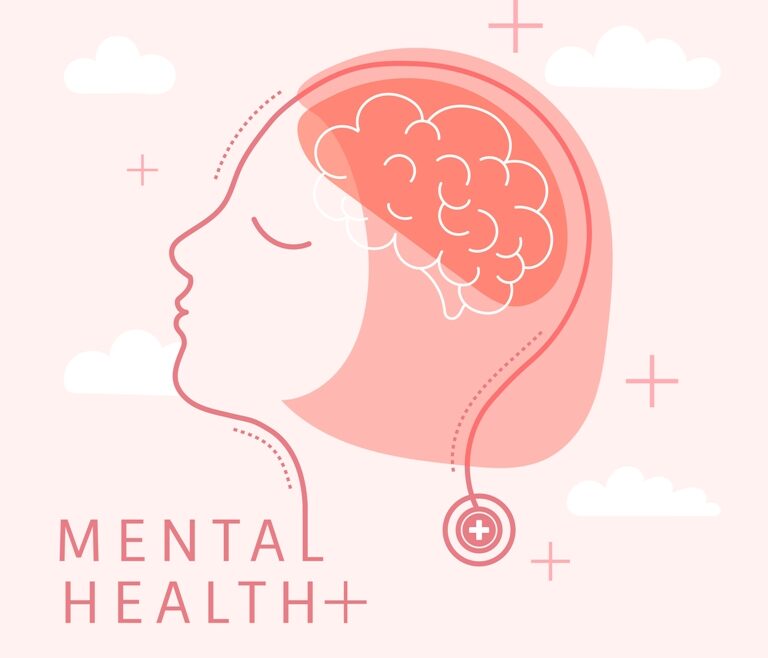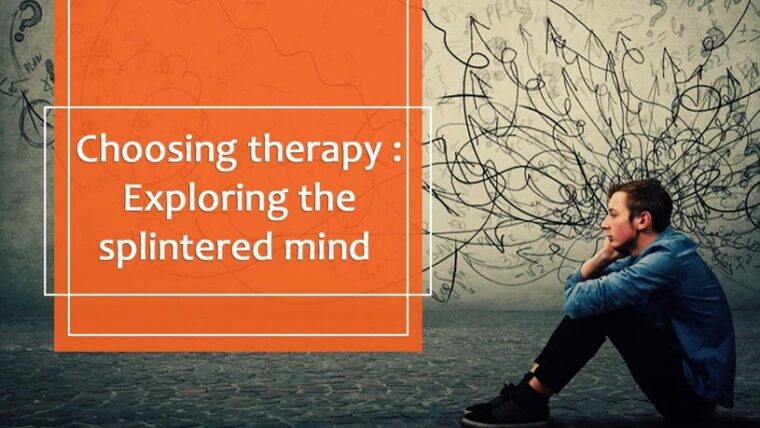Sometimes people struggling with mental health symptoms, such as anxiety and sadness, experience relief after receiving a diagnosis. Others experience a sense of anger or defeat, while others feel like a diagnosis is “just words.”
It’s normal to feel several conflicting emotions at the same time—the relief of having a name for what’s bothering you, and fear and anger that you received a diagnosis. You might feel like your mental illness carries negative perceptions or feel hesitant to accept your diagnosis. Still, a diagnosis can be a valuable resource in receiving effective treatment and improving your overall quality of life.
What is Mental Illness?
Mental illness is a broad term involving a wide variety of mental health conditions that affect the way you feel and think. The Center for Disease Control (CDC) defines it as “conditions that affect a person’s thinking, feeling, mood, or behavior.” Similarly, the World Health Organization (WHO) defines mental disorders as “a combination of abnormal thoughts, emotions, behavior, and relationships with others.”
Some common mental illnesses include major depression, bipolar disorder, post-traumatic stress disorder (circumstantial PTS or ongoing PTSD), and anxiety. That is just a short list of various psychiatric disorders that affect many people every day. Mental illness can also change your ability to function in everyday life. Several factors, including genetics, environment, and daily habits, influence mental illness.
Mental Health Statistics
Mental health problems are common in the United States. According to the National Alliance on Mental Illness (NAMI), about one in five American adults annually experience at least one mental health condition. In contrast, approximately one in five Americans experience a mental illness during adolescent years.
Although mental health problems are common, they vary in severity. Approximately one in 25 American adults experience severe mental illness annually. Severe mental illnesses can significantly reduce an individual’s ability to function in everyday life. According to the National Institute of Mental Health, women are more likely to experience severe mental illness than men.
Mental Illness Symptoms
Though each type of mental illness is associated with different symptoms, many conditions share similar symptoms. Common symptoms of mental illness may include:
- Not eating enough or overeating
- Insomnia or oversleeping
- Withdrawal from other people and previously enjoyed activities
- Feeling fatigued after getting enough sleep
- Feeling numbness or difficulty experiencing empathy
- Unexplainable body aches and pains or nausea
- Feeling hopeless, helpless, or lost
- Smoking, drinking or using illicit drugs
- Feeling confusion, irritability, anger, anxiety, sadness, or low self-esteem
- Constantly fighting with friends and family members
- Extreme mood swings
- Constant flashbacks
- Hearing voices in your head that you can’t stop
- Having thoughts of hurting yourself or others
- Inability to function in day-to-day life
Periods of acute stress and emotional distress, such as a traumatic event or the current COVID-19 pandemic, can increase risk factors that could cause episodes of symptoms, making it difficult for individuals to maintain healthy behavior and carry out day-to-day activities. This period is sometimes referred to as a mental health crisis.
You may be at risk for post-traumatic stress disorder if you experience emotional trauma or reminders of past traumas.
Coping With Mental Illness
The symptoms of many mental health conditions may grow worse if left untreated. If you believe you or someone you may know is struggling with a mental illness, reach out for professional help.
It’s essential to keep in mind that you can live a fulfilling and happy life with a mental illness. Working with a therapist will help you learn healthy ways to manage your mental health.
Getting a Diagnosis
Unlike physical health conditions, there’s no physical medical test that can provide a diagnosis of mental illness. If you believe you’re struggling with mental illness, start by contacting your healthcare provider. Your healthcare provider will review your medical history and rule out any underlying health conditions that may be causing symptoms. You can also search online for therapists near you or ask trusted friends and family members about mental health professionals in your community.
Next, your healthcare provider will refer you to a mental health professional. Mental health professionals use the Diagnostic and Statistical Manual of Mental Disorders(DSM-5) to make diagnoses. The DSM-5 lists criteria, including feelings, behaviors, and symptoms that individuals must meet to qualify diagnostically for a specific mental illness, such as an anxiety disorder.
Why a Mental Health Diagnosis Matters
A healthcare professional will determine a diagnosis after learning more about you and your medical history. Sometimes, clinicians will perform medical tests to rule out other possible health conditions. However, mental health professionals cannot evaluate mental health using a single test. Instead, mental health professionals use their training and experience to determine how your symptoms fit into what they know about mental health.
Your diagnosis is a valuable tool for you and your mental health provider. Doctors and therapists use your diagnosis to advise you on treatment options and potential health risks. Your diagnosis will also tell your health insurance company that you have a mental health condition that requires medical care. An official diagnosis is needed to qualify for Social Security disability support or job protection under the Americans with Disabilities Act.
Although a diagnosis won’t automatically relieve your symptoms, receiving a diagnosis can help you move forward in the process of receiving treatment, managing your mental health, and protecting your rights.
Mental Health Treatment
Treatment for mental health conditions is not one-size-fits-all, and therapy does not offer a cure in the sense that you’ll never experience emotional or psychological distress in the future. Instead, treatment helps to reduce symptoms, address underlying causes, improve your quality of life, find and activate your strengths, and help you to move forward with your life and your goals.
You and your mental health care team will work together to explore different approaches to treatment. For many people, a combination of different treatment options is the most effective. The most common treatments include:
- Therapy: Forms of talk therapy, such as psychodynamic psychotherapy and cognitive-behavioral therapy (CBT), provide an opportunity for you to form a therapeutic relationship with your psychologist or other licensed mental health professional, which allows them to learn more about your experiences, feelings, behaviors, and thoughts. The benefits of therapy are extensive, and therapy can help you learn strategies to manage symptoms, develop problem-solving skills for stressful situations, find emotional support, improve your outlook and help you to strive towards your potential. Currently, many therapists are offering increased access to mental health services through online therapy. You may be interested in seeing a therapist, either for single talk therapy or even family or couples therapy.
- Medication: The most common medications used to treat mental health conditions include antidepressants, anti-anxiety medications, antipsychotic medications, and mood stabilizers. Working with a mental health professional – usually, a psychiatrist, psychiatric mental health Nurse Practitioner, or primary care physician – can help determine which type of medication is right for you. Some people may try a few medications at different doses before finding an option that works best for them.
- Residential treatment: Brief periods of intensive treatment at the hospital or residential treatment facilities allow in-depth treatment, which can help individuals with a medical emergency or mental health crisis. Daytime programs, support groups, art therapy, and even therapy dog programs are also available to help patients foster social skills and overcome internalized stigma.
- Lifestyle changes: Alternative treatments can also be a good idea to help supplement mainstream treatments such as therapy and medication. Avoiding alcohol and drugs, adopting a healthy lifestyle, and practicing self-care can help manage your symptoms more effectively. You may also look into becoming more active and in your body, perhaps through physical therapy, regular aerobic exercise, or by interacting with service dogs and other therapy animals, to improve your overall mindset.
What’s Next?
You may have already learned about your mental illness, or you may be struggling with symptoms for the first time. In either case, receiving a diagnosis can provide a good starting point for learning more. There is no one way to improve your condition; you can work to find what is best for you.
If you’re struggling to make sense of your symptoms, consider reaching out to a therapist through Beyond Therapy. Beyond Therapy connects each patient to a personalized shortlist of mental health professionals and uses science and research to match personal preferences.
We’ll match you with a psychologist, social worker, or another mental health professional you feel comfortable with, based on your preferences and requirements. There are many compassionate experts in mental health advocacy. One of the qualified therapists on Beyond Therapy will help you understand your symptoms and diagnosis to manage your health effectively.




